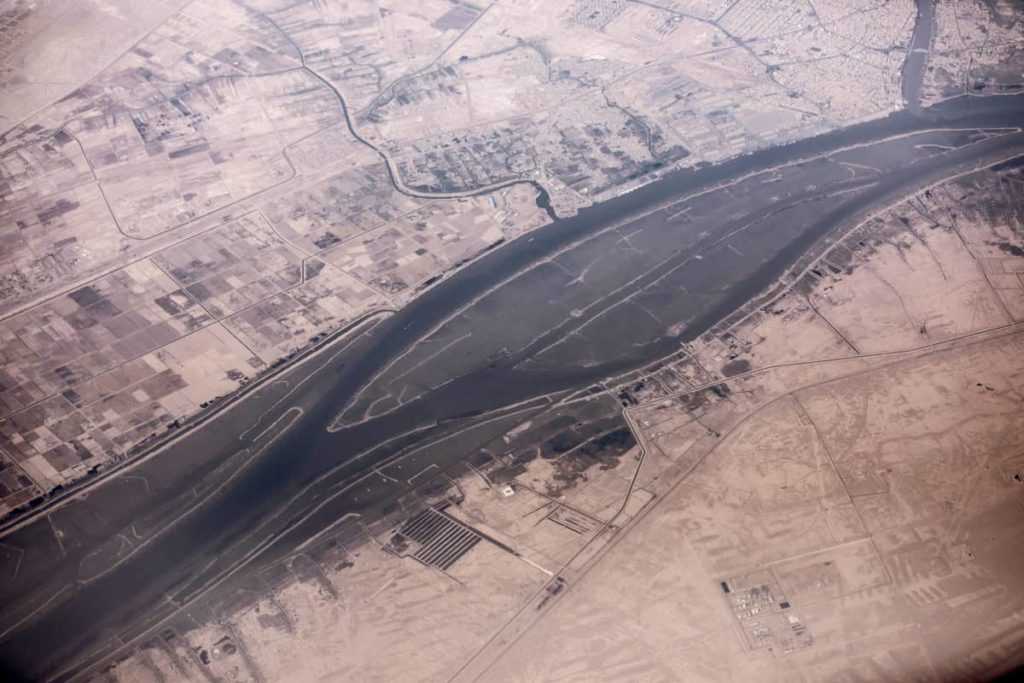Will Iraq’s new PM shake off Iran’s grip on the region?
As popular animosity towards Iran continues to grow, the Islamic Republic may lose its strategic foothold in the region. On May 7, the Iraqi Parliament swore in Mustafa Al-Kadhimi as its new prime minister. Iraqi officials are hopeful his leadership will bring stability to the region and curtail months of political unrest and protests.

Aerial view of the Iran, Iraq border and the Shatt al-arab river near Basra, Iraq.
Originally published by Jerusalem Post
As popular animosity towards Iran continues to grow, the Islamic Republic may lose its strategic foothold in the region.
On May 7, the Iraqi Parliament swore in Mustafa Al-Kadhimi as its new prime minister. Iraqi officials are hopeful his leadership will bring stability to the region and curtail months of political unrest and protests.
Since October Iraqi demonstrators have taken to the streets to protest economic turmoil and political corruption due to Iranian influence in the country. Iraqi politicians are optimistic that Al-Kadhimi’s background as director of Iraq’s National Intelligence Service and nationalist tendencies will aid in his success.
Kadhimi’s premiership was set in motion with a series of priorities geared at increasing confidence in the government. During his first week in office, al-Kadhimi issued a decision to free all anti-government demonstrators who were arrested by the previous administration. His government also announced its intent to create a committee dedicated to investigating the attacks on protesters and ordered compensation for the families of the 550 civilians killed at the hands of Iranian-backed militias.
Kadhimi also declared his commitment to maintain stability in the region, asserting that Iraq would not be used for launching attacks or settling accounts with other countries. Tensions between Tehran and the U.S. on Iraqi soil have escalated following the assassination of Qassem Soleimani, commander of Iran’s Quds Force. Since then, Iranian-backed militias have repeatedly perpetuated attacks on Iraqi military bases housing U.S. military across the region. In the latest round of attacks 9 weeks ago, Iranian proxies sent 25 107 mm rockets into Camp Taji, a military base north of Baghdad, seriously injuring two Americans. In January, proxies launched five rockets near the US Embassy in Baghdad’s fortified Green Zone, one landing inside embassy walls.
Kadhimi’s decision to prioritize countering Iranian intervention in Iraq bodes well for his success. Over the last few years, Iran’s grip on Iraq has been significantly weakened. According to the Center for Strategic & International Studies, the percentage of Shias who support Iran has plunged from 70% in 2016 to 15% by December 2019. The percentage of Shias who view Iran as a trusted ally has also declined by nearly 50%.
The October 2019 protests that swept Iraq solidified these numbers further. The Popular Mobilization Units (PMU), an umbrella group for a number of Iranian-backed militias, is responsible for much of the violence that ensnared the demonstrations. The PMU was established in the fight against ISIS but over the years has transformed into another violent Iranian export.
Iraqi’s contempt for Tehran’s interference in the region was recently exemplified on the May 22 ‘Quds Day.’ This annual anti-Israel event initiated by Iran in 1979 focuses on the “liberation” of Jerusalem from the “Zionist Jews.” Iraqi protestors were recorded tearing down Iranian propaganda posters in Diyala province.
As economic and political problems strain Iraq, Kadhimi’s initial months in office will be challenging. The Prime Minister will be forced to balance a crumbling Iran-Iraq relationship amid escalating US-Iranian tensions. Fortunately for the West, Kadhimi appears to be more independent from Iran than his predecessors.
- America’s Supercarriers Are Back in Force in the Pacific - December 30, 2025
- Israel’s $2 Iron Beam Laser Could Disrupt Missile Warfare - December 23, 2025
- US Stands Up New Drone Strike Force in the Middle East - December 9, 2025
